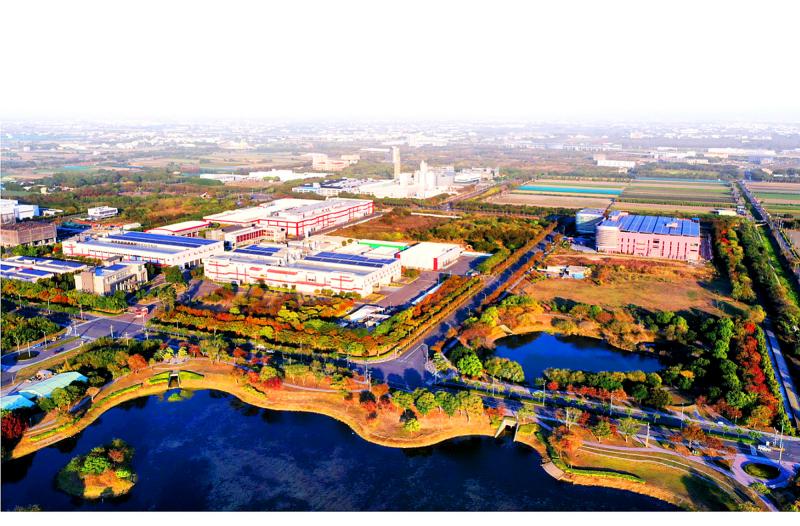Chip testing and packaging company Siliconware Precision Industries Co (SPIL, 矽品精密) plans to invest NT$97.5 billion (US$3.26 billion) to build a new plant in Yunlin County’s Huwei Township (虎尾), creating a new semiconductor hub in the agricultural county, the Central Taiwan Science Park (CTSP, 中部科學園區) said yesterday.
The plant would generate NT$35.4 billion in annual revenue once it is fully utilized, the science park said in a statement.
The facility, which is to cover 14.5 hectares, would create 2,800 jobs in the county, it said.

Photo courtesy of the Administration of Central Taiwan Science Park
“The latest project shows SPIL’s commitment to invest in Taiwan and demonstrates its determination to keep crucial manufacturing technology in the country,” SPIL chief administrative officer Chien Kun-yi (簡坤義) said after meeting with Yunlin County Commissioner Chang Li-shan (張麗善).
SPIL has been scouting potential locations for a plant in central Taiwan and finalized the location yesterday, Chien said.
Construction would start in the fourth quarter of this year, the company said, adding that first-phase operations are scheduled to begin in 2024.
The announcement came as SPIL’s parent company, ASE Technology Holding Co (日月光投控), proceeds with a capacity expansion to keep up with rising demand.
ASE on Friday broke ground on a NT$30 billion expansion of its facilities in Taoyuan’s Jhongli District (中壢).
The new facility is expected to start operations in the third quarter of 2024, it said.
It would contribute US$60 million in production value, ASE said in a separate statement, adding that it would create 2,000 jobs.
The new facilities would produce advanced IC packaging and testing technologies, such as wire bonding, flip-chip packaging and wafer-level packaging, ASE said.
ASE in April told investors that revenue growth this year would be supported by strong demand for high-performance computing, networking and automotive devices.
That would offset weakness in smartphone and consumer electronics segments, it said.
Chen Tien-ssu (陳天賜), president of ASE’s Jhongli plant, on Friday said that the existing facilities, which employ about 12,000 people, are operating at full capacity amid solid demand for high-performance computing, automotive electronics, 5G and Internet of Things devices.
Despite industry reports of scaled-backed orders and rising inventories, Chen said he expects the plant to continue operating at full capacity through the end of this year.
Additional reporting by CNA

SEEKING CLARITY: Washington should not adopt measures that create uncertainties for ‘existing semiconductor investments,’ TSMC said referring to its US$165 billion in the US Taiwan Semiconductor Manufacturing Co (TSMC, 台積電) told the US that any future tariffs on Taiwanese semiconductors could reduce demand for chips and derail its pledge to increase its investment in Arizona. “New import restrictions could jeopardize current US leadership in the competitive technology industry and create uncertainties for many committed semiconductor capital projects in the US, including TSMC Arizona’s significant investment plan in Phoenix,” the chipmaker wrote in a letter to the US Department of Commerce. TSMC issued the warning in response to a solicitation for comments by the department on a possible tariff on semiconductor imports by US President Donald Trump’s

The government has launched a three-pronged strategy to attract local and international talent, aiming to position Taiwan as a new global hub following Nvidia Corp’s announcement that it has chosen Taipei as the site of its Taiwan headquarters. Nvidia cofounder and CEO Jensen Huang (黃仁勳) on Monday last week announced during his keynote speech at the Computex trade show in Taipei that the Nvidia Constellation, the company’s planned Taiwan headquarters, would be located in the Beitou-Shilin Technology Park (北投士林科技園區) in Taipei. Huang’s decision to establish a base in Taiwan is “primarily due to Taiwan’s talent pool and its strength in the semiconductor

An earnings report from semiconductor giant and artificial intelligence (AI) bellwether Nvidia Corp takes center stage for Wall Street this week, as stocks hit a speed bump of worries over US federal deficits driving up Treasury yields. US equities pulled back last week after a torrid rally, as investors turned their attention to tax and spending legislation poised to swell the US government’s US$36 trillion in debt. Long-dated US Treasury yields rose amid the fiscal worries, with the 30-year yield topping 5 percent and hitting its highest level since late 2023. Stocks were dealt another blow on Friday when US President Donald

UNCERTAINTY: Investors remain worried that trade negotiations with Washington could go poorly, given Trump’s inconsistency on tariffs in his second term, experts said The consumer confidence index this month fell for a ninth consecutive month to its lowest level in 13 months, as global trade uncertainties and tariff risks cloud Taiwan’s economic outlook, a survey released yesterday by National Central University found. The biggest decline came from the timing for stock investments, which plunged 11.82 points to 26.82, underscoring bleak investor confidence, it said. “Although the TAIEX reclaimed the 21,000-point mark after the US and China agreed to bury the hatchet for 90 days, investors remain worried that the situation would turn sour later,” said Dachrahn Wu (吳大任), director of the university’s Research Center for